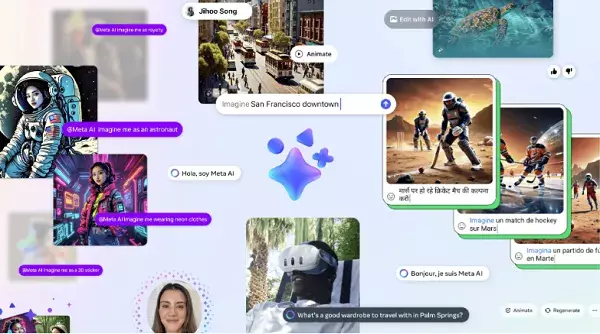Meta, formerly known as Facebook, is pushing forward with its AI development plan despite facing regulatory challenges in Europe. The company recently announced the expansion of its Meta AI chatbot to seven additional languages, as well as introducing new creative functions within the chat stream. This move demonstrates Meta’s commitment to advancing AI technology and providing users with more interactive tools.
In addition to expanding access to Meta AI in more regions, such as Argentina, Chile, and Mexico, users can now interact with the chatbot in languages like French, German, and Italian. While Meta’s AI chatbot has received mixed reviews, Meta CEO Mark Zuckerberg remains optimistic about its potential to become the most widely used AI assistant globally. With millions of users across Facebook, WhatsApp, and Instagram, Meta has a significant advantage in promoting its AI tools to a vast audience.
Meta is also introducing new features to enhance the user experience with its AI chatbot. Users can now create AI-generated images of themselves directly within the chat stream, enabling them to envision themselves as superheroes or professional athletes. This functionality, known as “Imagine me,” allows users to personalize their images based on prompts provided by the AI model.
Moreover, Meta is offering new editing tools for AI-generated images, giving users the ability to customize and refine their creations. This feature allows users to add or remove objects from images and make edits while maintaining the overall composition. By empowering users to tailor their AI-generated images, Meta aims to provide a more immersive and personalized experience.
Despite the innovative advancements in AI technology, some critics are wary of Meta’s broader integration of AI content into its platforms. There is a growing concern that the proliferation of AI-generated content may overshadow the human element and social dynamics of social media interactions. While AI tools can enhance creativity and expand possibilities, they may also reduce the authenticity and connectivity of user interactions.
One particular feature that has raised eyebrows is the option for users to add AI-generated images to their Facebook posts. While this feature may offer creative opportunities, it also raises questions about the authenticity and integrity of online content. The balance between AI-driven enhancements and genuine human interactions is a critical consideration for Meta as it continues to develop its AI tools.
Meta is also venturing into the realm of virtual reality (VR) by launching Meta AI in beta for selected users in North America. This new feature will replace the current Voice Commands on Quest, allowing users to control their VR headsets hands-free and access real-time information. The integration of Meta AI into VR opens up exciting possibilities for immersive experiences and interactive storytelling.
The future potential of Meta’s AI tools in VR development could revolutionize the way users engage with technology. By enabling users to create VR experiences based on simple text prompts, Meta’s AI technology has the potential to democratize VR content creation. This shift towards more accessible and user-friendly VR experiences aligns with Meta’s long-term vision of integrating AI into everyday interactions.
Meta’s expansion of its AI developments signals a new era of interactive technology with enhanced creative capabilities and immersive experiences. While there are concerns about the potential impact of AI integration on social interactions, Meta’s focus on future opportunities in VR demonstrates its commitment to pushing the boundaries of AI innovation. As users adapt to these new AI tools and functionalities, the future of AI interaction is poised to reshape digital experiences in profound ways.


Leave a Reply